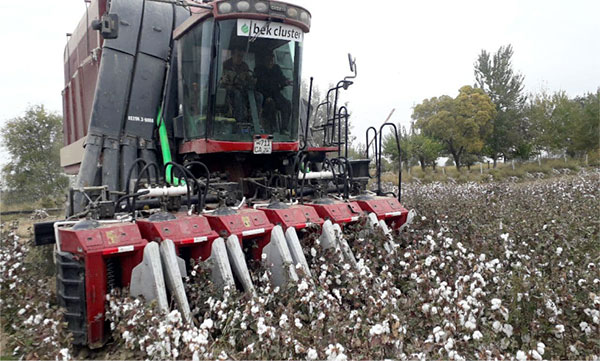Customer
The joint Uzbek-British venture “BEK CLUSTER” is one of the largest agricultural producers in the country. The company specializes in growing of grain cultures and cotton. “BEK CLUSTER” owns the largest complex of hydroponic greenhouses for growing tomatoes and other vegetables in Uzbekistan.
A research center is being created in the company, and shortly, own factory focused on production of cotton fabric will be launched.
![]() 5000 employees
5000 employees
![]() 35 000 hectares of arable land
35 000 hectares of arable land
![]() 300+ units of machinery
300+ units of machinery
Machinery
Main agricultural machinery fleet includes:
- 120 units of NewHolland universal tractors − power 110 hp, fuel tank 250 l, fuel consumption 26 l/h;
- 36 units of cotton-growing tractors TTZ − power 99 hp, fuel tank 115 l, fuel consumption 22 l/h;
- 21 units of Kirovets general-purpose tractors − power 300 hp, fuel tank 640 l, fuel consumption 49 l/h;
- 46 units of Case cotton combine and thresher harvesters − power 270-300 hp, fuel tank 570-750 l.
According to standards, fuel consumption of tractors is 28-30 l / ha, of combine harvesters – 32 l / ha. On average, one unit of machinery cultivates from 20 to 30 hectares per day. So, daily from 140,000 to 200,000 liters of diesel fuel are written off for vehicles (at a price of $ 0.55 per liter, total fuel costs amount to $ 75,000 – $ 110,000 per day).

Task
The enterprise had to solve three urgent tasks.
1. Monitoring machinery operation in field – precise definition of cultivated area, volume of daily work, route of movement from parking areas to a field and back. These data provide an accurate calculation of machinery efficiency, reduction of inappropriate mileage, and also allows tying driver’s/operator’s wages to the results of their work.
2. Fuel consumption monitoring – measurement of real hour consumption of each unit of machinery, fuel consumption per day. Previously, when the fuel was accounted according to quotas, the economic efficiency of production was determined with a large inaccuracy. Over and above, management of the enterprise had suspicions, that some workers were draining fuel from vehicles and machines.
3. Machine running time tracking – total engine operating time and by the modes (Idle, Optimal, Overload). Analysis of data on engine operating time allows:
- reducing operating time in non-optimal modes and thereby increase engine’s life cycle;
- carrying out maintenance not according to “same for all” standards, but to actual engine operating time.

Solution
Fuel consumption monitoring systems were installed on 300 units of client’s machinery and vehicles. Each system includes DFM D differential fuel flow meter with CAN interface and a GPS tracker.
Differential fuel flow meter directly measures fuel consumption in supply and return fuel lines and calculates the difference in flow rates. There is no need to change engine fuel scheme – this greatly simplifies and speeds up flow meter installation.
Fuel flow meter keeps fuel consumption and engine operating time Counters – total and by operating mode (Idle, Optimal, Overload). The Counter values are transmitted to GPS tracker in a form of digital messages.
The body of flow meter is sealed to provide protection against interference. After installation, the connections to fuel lines and connection module of signal cable are sealed.
Data gathered by flow meter goes to Bitrek GPS tracker with CAN interface. The tracker transmits information to a specialized telematics service for agricultural land monitoring – Cropio.


Muchtarov Aziz, CEO of Technoton Dealer Center in Uzbekistan
“To solve the task of fuel monitoring and engine operating time tracking, we offered to install DFM D differential fuel flow meters with CAN interface. Our client was satisfied with accuracy of the fuel meter and with the speed of installation.
It turned out, that autonomous mode, that allows gathering data when external power supply is switched off thanks to in-built battery of DFM, is very useful. Even if the power is turned off, all data is registered in digital Counters in an internal memory of DFM fuel flowmeter. After the power supply is back all data is sent to telematics server.”
Result
As a result of telematics system installation, all the tasks have been solved successfully.
1. Telematics service provides online information on the location and route of each unit of machinery, data on the cultivated area or the weight of the harvested crop.
2. Data on real fuel consumption received from fuel flow counters made it possible to build an accurate fuel accounting system. Consumption rates have been optimized, fuel theft has been stopped. Fuel costs have been reduced by 30%!
3. Maintenance is carried out according to actual engine operating time. All oils, filters and other consumables are changed according to their actual condition, which leads to an increase of engine’s life.

Oybek Satibaldiev, BEK CLUSTER founder
“DFM D fuel flow meters provide accurate and complete information on fuel consumption and running time of machinery. Occasions of fuel theft have completely stopped.
We also were delightfully surprised to get an unexpected additional effect. Tractor drivers have stopped selling stolen fuel and, to maintain their income level, have started to work better – so, their labor productivity has increased by 15%.”


